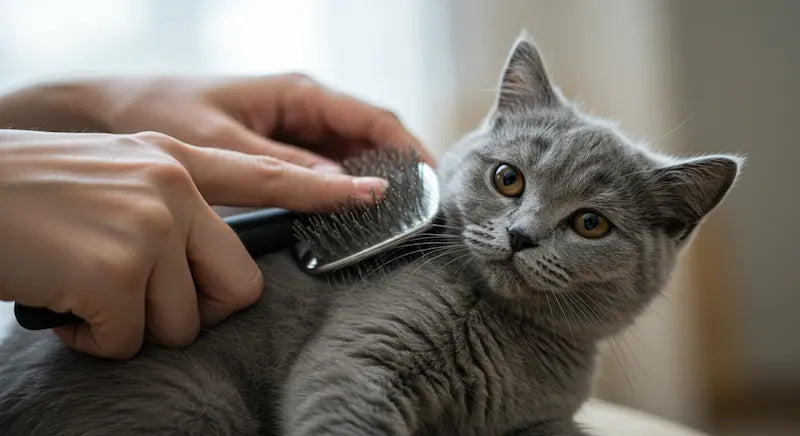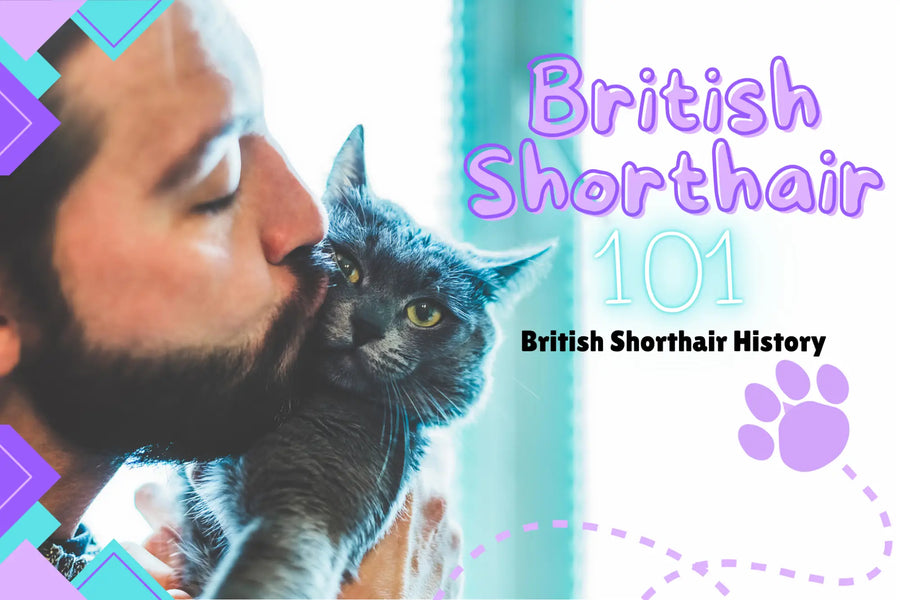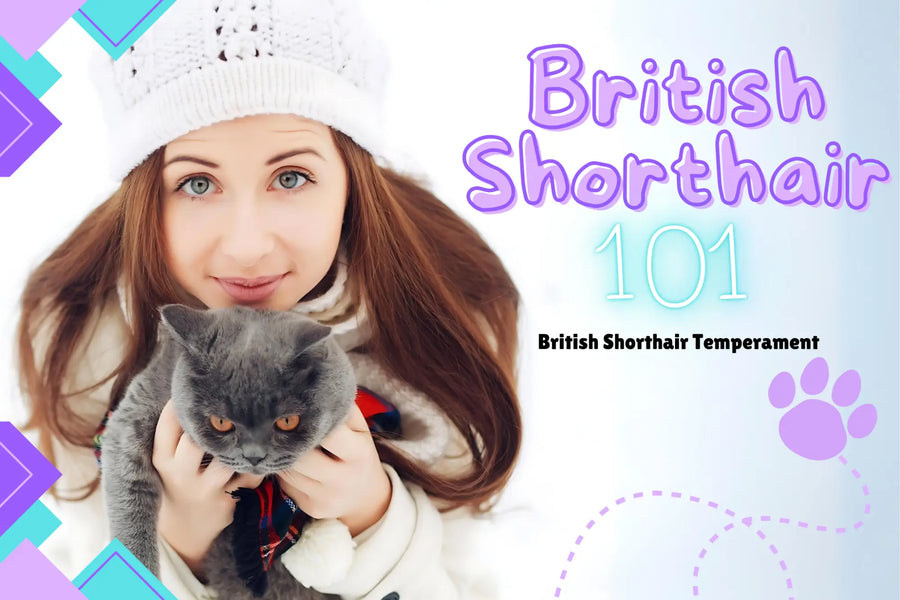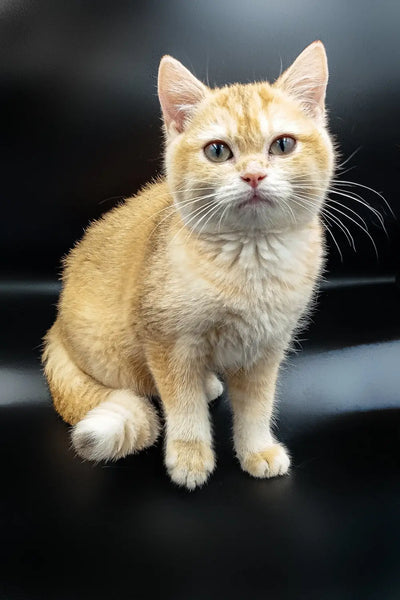Are British Shorthair Cats Hypoallergenic? Key Insights for Allergy-Sensitive Cat Lovers

You're in love with the plush, teddy-bear look of the British Shorthair—those round faces, copper eyes, and dense, velvety coats are utterly irresistible. You've already imagined one of these charming felines curled up on your sofa, their signature calm demeanor perfectly complementing your home. There's just one nagging concern holding you back: your allergies. That familiar tightness in your chest, the inevitable sneezing, the itchy eyes—can this dream companion really fit into your life without the constant sniffles?
It's a heartbreaking dilemma that many potential pet parents face—the emotional pull toward companionship at odds with the physical reality of allergic reactions. You're not alone in wondering: are British Shorthair cats hypoallergenic? Is there hope for creating a comfortable shared space with these beloved blue-gray beauties?
In this guide, we'll explore the reality behind cat allergies, examine the specific traits of British Shorthairs that might affect your sensitivity, and provide practical, actionable strategies to help you make an informed decision. Whether you're considering adding a British Shorthair to your family or already sharing your home with one and struggling with allergic reactions, you'll find the clarity and guidance you need to move forward with confidence.
Understanding Cat Allergies: Beyond the Myth of Hypoallergenic Cats
Before we answer the specific question of whether British Shorthair hypoallergenic cats exist, let's clarify what "hypoallergenic" actually means in the context of pet ownership.
What "Hypoallergenic" Really Means
The term "hypoallergenic" doesn't mean "allergy-free" as many people assume. Rather, it indicates that something is less likely to trigger allergic reactions compared to other similar items. When applied to cats, "hypoallergenic" refers to breeds that typically produce fewer allergens or shed less of the compounds that cause allergic reactions in humans.
This distinction is crucial: no cat breed is completely non-allergenic. Anyone claiming to offer 100% allergy-free cats is, unfortunately, providing misleading information. Even hairless breeds like the Sphynx still produce allergens that can affect sensitive individuals.

The Real Culprit: Fel d 1 Protein
Contrary to popular belief, cat allergies aren't primarily caused by fur. The main allergen is a protein called Fel d 1, which is produced in cats' saliva, skin glands, and to a lesser extent, urine. When cats groom themselves (which they do frequently), they spread this protein onto their fur. As the saliva dries, microscopic particles containing Fel d 1 become airborne and can remain suspended in the air for hours or even days.
These particles are so small and lightweight that they easily make their way into your respiratory system, triggering allergic responses in sensitive individuals. This explains why even people who aren't directly handling a cat might experience reactions simply by being in an environment where cats live.
All cats produce Fel d 1, though the amount varies significantly based on factors including:
-
Individual cat genetics (even within the same breed)
-
Gender (intact male cats typically produce more allergens)
-
Age (kittens may produce fewer allergens than adult cats)
-
Coat color (some research suggests lighter-colored cats might produce slightly fewer allergens)
Despite what you might read elsewhere, no cat breed has been scientifically proven to be completely free of Fel d 1 production. Some breeds, however, do seem to cause fewer reactions in allergy sufferers—either because they produce less Fel d 1 or because other characteristics of the breed (like reduced shedding) help minimize allergen distribution.
Are British Shorthair Cats Hypoallergenic? The Straight Answer
Now for the direct answer to the question at hand: are British Shorthairs hypoallergenic? In short, no—British Shorthairs are not considered a hypoallergenic breed. They do produce the Fel d 1 protein and can trigger reactions in allergy-sensitive individuals.
However, there's more nuance to this answer that deserves exploration. While British Shorthairs aren't classified among the more allergy-friendly breeds (like Siberian, Balinese, or Russian Blue cats), some of their specific characteristics might make them more tolerable for people with mild to moderate cat allergies compared to high-shedding, high-maintenance breeds.

Why British Shorthairs Might Cause Fewer Reactions
Several factors specific to the British Shorthair hypoallergenic question might work in favor of allergy sufferers:
1. Lower Grooming Needs
British Shorthairs are known for their dense, plush coats that require surprisingly little maintenance. Unlike many breeds that spend hours each day meticulously grooming themselves, British Shorthairs tend to be less obsessive about self-grooming. This matters because grooming spreads saliva (containing Fel d 1) throughout the coat.
With less grooming comes less saliva distribution, potentially resulting in fewer allergens being spread through the environment. Their thick, dense coats may actually trap some of the dander and allergens closer to the skin rather than releasing them into the air.
2. Calm, Independent Personality
A cat's personality and behavior can significantly impact allergen distribution. British Shorthair hypoallergenic cats aren't technically a reality, but their famous laid-back temperament might help minimize allergen exposure in several ways:
-
They're less likely to engage in excessive licking and over-grooming behaviors
-
They tend to be less "in your face" than some needier breeds
-
They're typically content with moderate rather than constant physical contact
-
Their relaxed nature means less running, jumping, and other activities that can stir up allergens
For allergy sufferers, a cat that's content to sit quietly nearby rather than constantly demanding to be on your lap or rubbing against your face can make a meaningful difference in symptom management.
3. Consistent, Predictable Shedding
While British Shorthairs do shed, their shedding pattern tends to be more predictable and manageable compared to some other breeds. Their dense double coat typically sheds seasonally rather than continuously, allowing for targeted grooming during shedding seasons.
This doesn't mean they don't shed—they absolutely do, particularly during seasonal changes. However, consistent grooming during these periods can significantly reduce the amount of loose fur and dander in your home.
The Verdict
While not technically hypoallergenic British Shorthair cats by definition, many allergy-sensitive cat lovers report being able to live comfortably with British Shorthairs, especially when implementing appropriate allergy management strategies. Their particular combination of physical and temperamental traits may make them more suitable for those with mild allergies compared to some other popular breeds.
That said, individual experiences vary widely. Some people with cat allergies react strongly to British Shorthairs, while others find them quite tolerable. The only reliable way to determine your personal compatibility is through direct exposure before making a long-term commitment.
5 Ways to Minimize Allergies With a British Shorthair
Even though British Shorthairs aren't truly hypoallergenic, many allergy-sensitive cat lovers successfully share their homes with these charming companions by implementing these strategies:
1. Create Designated Cat-Free Zones
Make your bedroom a priority allergen-free sanctuary, as you spend about one-third of your life there. Install door sweeps to prevent allergens from drifting under gaps. Consider making your home office or a formal living room cat-free as well.
2. Invest in Air Filtration Systems
Since Fel d 1 particles are microscopic and airborne, HEPA air purifiers can dramatically reduce symptoms. Place them in main living areas and bedrooms, and replace filters regularly. Consider whole-home filtration if your budget allows.
3. Implement a Regular Grooming Routine
Brush your British Shorthair 2-3 times weekly (daily during shedding seasons) to capture allergens before they become airborne. Have a non-allergic person handle grooming when possible, preferably in well-ventilated areas or outdoors.
4. Maintain Rigorous Cleaning Protocols
Vacuum twice weekly with a HEPA-filter vacuum, wash bedding in hot water weekly, and use microfiber cloths for dusting. Consider hard flooring instead of carpeting, and regularly clean cat furniture and toys.
5. Consider Gender and Color in Your Selection
Spayed females and neutered males produce fewer allergens than unneutered males. Some research suggests lighter-colored cats might produce slightly less Fel d 1. Remember that individual variation is significant—spend time with the specific cat before committing.

Living Successfully with a British Shorthair Despite Allergies
Many allergy-sensitive cat lovers successfully share their lives with British Shorthairs by combining the strategies above with a few additional approaches:
Medical Management Options
While environmental strategies form the foundation of allergy management, medical interventions can provide additional relief:
-
Consult an allergist: A board-certified allergist can determine the severity of your cat allergies and recommend appropriate treatments
-
Consider immunotherapy: Allergy shots can reduce sensitivity over time for some individuals
-
Use appropriate medications: Antihistamines, nasal sprays, and other allergy medications can help manage symptoms
-
Try allergy-reducing pet products: Some products claim to reduce allergens when applied to your cat's coat (though scientific evidence for these varies)
Test Before You Commit
If you're seriously considering adding a British Shorthair hypoallergenic companion to your family despite allergies, arrange for an extended trial period:
-
Visit homes with British Shorthairs multiple times to assess your reaction
-
Ask breeders if you can spend several hours with adult cats (not just kittens)
-
Consider fostering a British Shorthair before making a permanent commitment
-
Implement allergy management strategies during your trial to gauge their effectiveness
This investment of time upfront can prevent heartbreaking situations where allergies force rehoming a beloved pet.
The Bottom Line: British Shorthairs and Allergies
To directly answer the question—are British Shorthair cats hypoallergenic?—no, they are not classified as a hypoallergenic breed. However, their dense coats, less frequent grooming habits, and calm temperaments might make them more tolerable for some allergy sufferers. With proper allergen management strategies, many people with mild to moderate allergies successfully share their homes with these plush-coated companions.
Your experience will depend on your specific sensitivity, the individual cat, and your commitment to allergen management. For many, the joy of these affectionate companions makes the occasional sniffle worthwhile. With thoughtful planning and consistent allergen control, a British Shorthair can become part of your family. Consider spending time with these charming cats in person and implementing allergy strategies before making your decision.




























































Comments(0)